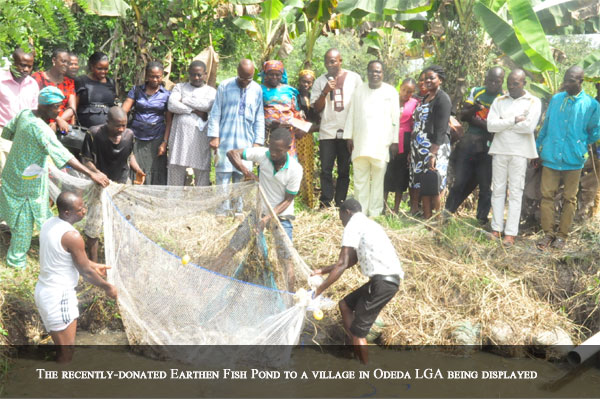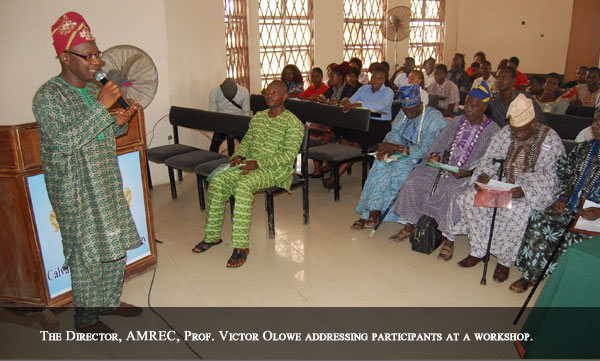
The West African Agricultural Productivity Project (WAAPP), in collaboration with the Training and Farm Demonstration (TFD) Programme, Agricultural Media Resources and Extension Centre (AMREC) of the University, have organised a Field-day Workshop, to gather feedback on the effectiveness of the various training initiatives to enhance farmers’ productivity, as the Bank of Industry (BoI), is also unfolding a new credit package that would promote agriculture.
The Project Coordinator of WAAPP in the University and Director, Institute of Food Security, Environmental Resources and Agricultural Research (IFSERAR), Professor Akin Omotayo, has reiterated the commitment of WAAPP Nigeria to developing best agricultural methods and practices that would increase the productivity of farmers in rural areas, adding that the objectives of the project include the dissemination of improved technologies among farmers, improvement of the welfare of farmers across Africa, and the empowerment of farmers to increase their productivity.
Professor Omotayo disclosed that the training, which began last April, was not to introduce a new occupation that the farmers knew nothing about, but to build on what they were accustomed to with new technological and improved methods that would bring about maximum output. He noted that the donation of improved seeds like rice, different varieties of maize with high protein content, cassava stems and fingerlings, which have very high tendency for survival and productivity would make life better for the rural farmers.
The Director of AMREC, Professor Victor Olowe, appreciated the farmers for accepting to plant the rice and maize seedlings given to them by WAAPP. He encouraged them to continue the work, not minding the challenges involved, assuring them of the unflinching support of WAAPP through FUNAAB. He said that unlike other communities that did not utilize the seeds given to them, the Adao Community farmers, made the best use of the opportunity. Professor Omotayo formally handed-over a deep well and Earthen Fish Pond donated by WAAPP to farmers in adopted villages in the Odeda Local Government Area of Ogun State, stating further that a smoking kiln equipment would soon be given for their communal use.
A representative of the benefitting farmers’ group, Alhaji Oladunjoye Akorede, expressed his appreciation to WAAPP, as he implored other farmers to embrace the project for their own benefit. He enumerated several benefits he had gained from the project to include single-handedly owning a poultry farm which has about 750 layers of birds that produce a dozen crates of eggs at once. Alhaji Akorede thanked the Project Coordinator and other stakeholders for making farmers to reap the dividends of the new and improved method of farming that had greatly improved their productivity. According to him, new seeds of maize, cassava stem, rice, plantain tuber and others had helped to reduce the period of harvesting their farm produce and yielding maximum output. He promised to teach as many farmers as possible on what they needed to know about the new farming methods.
In a similar development, the Director of AMREC, Professor Victor Olowe, has encouraged farmers in Ogun State to persevere and be diligent in their vocation as better days were still coming. Professor Olowe stated this during the training session held for farmers on Cotton Production and Management in Nigeria, at Ijaka-Oke, Yewa North Local Government Area of Ogun State. Professor Olowe’s optimism is as a result of the ongoing effort between the government and stakeholders in the cotton industry, which when concluded, would boost the economic status of farmers, noting that the government could not afford to ignore the cotton sector.
The Director of Tree Crops, Ogun State Ministry of Agriculture, Mr. Gbenga Oyesola, also stated that farmers would soon be reaping direct benefits from an international collaboration tagged, Ecosystem-Based Adaptation for Food Security, an initiative of both the United Nations and the African Union in tackling food insecurity and poverty in Africa.
Mr. Oyesola, said the project would tackle the challenges of climate change on food security, as farmers would be trained and equipped on practical methods of cultivation that would be suitable to meet up their negative ecological circumstances. Mr. Oyesola, an alumnus of FUNAAB, assured that AMREC was being partnered to ensure an impactful outreach of the initiative to a good number of farmers in Ogun State and to ensure that farmers benefitted from the programme. The Chairperson, National Cotton Association of Nigeria, South-West, Chief (Mrs.) Lola Kushimo-Adeoye, on her part, enjoined male cotton growers to encourage their wives to develop interest in the vocation by establishing their personal farms rather than being ordinary farm-hand-helps.

Meanwhile, the Bank of Industry (BoI) is set to sponsor a new credit proposal, designed to promote the maximisation of value chains in sugarcane production and processing for economic rejuvenation. The Lagos State Officer for the bank, Mr. Raymond Adenuga, said BoI was inspired to “develop a paper that will recommend the financing of the processing of sugarcane at not more than 9 percent interest rate per annum”. The initiative to design a new credit line for farmers and processors, was a fall-out of the recent Workshop on Sugarcane Production, themed “Maximising the Sugarcane Value Chain in Nigeria”, organised by AMREC, in collaboration with the Calvary College of Technology, Papalanto, Ogun State and the Ogun State Agricultural Development Project (OGADEP).
For farmers to optimally benefit from the facility when fully developed, Mr. Adenuga enjoined them to form themselves into cooperative groups with the aim of registering joint business ventures because BoI does not give loans to private individuals but only recognises corporate bodies. He reiterated the need for proper record-keeping by farmers and the importance of transacting their financial activities through commercial banks, to be eligible for credit facility from BoI.
The Director of AMREC, Professor Victor Olowe, stated that the training was timely, considering the fact that the retardation in the production capacity of sugar in Nigeria had started generating concern on whether it could meet the needs of the growing population. Resource persons present at the workshop included the Director, Centre for Sugarcane Value Chain Research and Development of Calvary College of Technology, Papalanto, Mr. Lawrence Chima, who spoke on the topic, “Sustainable Processing of Sugarcane under the Value Chain Development Programme”; Mr. Popoola Adedayo of OGADEP; the Programme Leader, Training and Farm Demonstration of AMREC, Dr. Olalekan Olaoye; and representatives of corporate bodies such as Lafarge Cement Company, All Farmers’ Association of Nigeria (AFAN); and a Royal Father, the Onipapa of Papalanto, Oba Rasak Famuyiwa.
